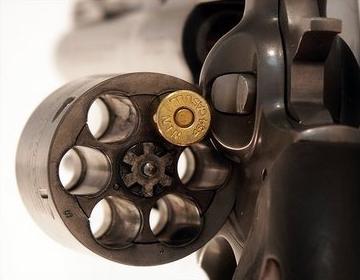Is it better to go first in Russian Roulette?
 Rules:
Rules:
There are six chambers in the revolver. The initial position of the bullet is equally random between positions 1 through 6: the chamber is spun only once at the start of the game. The first player points the gun at himself and pulls the trigger, passes it to the other, they pull the trigger and pass to the other player and repeat until the bullet fires.
Which player has better odds of survival?
Inspired by this .

This section requires Javascript.
You are seeing this because something didn't load right. We suggest you, (a) try
refreshing the page, (b) enabling javascript if it is disabled on your browser and,
finally, (c)
loading the
non-javascript version of this page
. We're sorry about the hassle.
Instead of stopping when the bullet is fired, keep the game going until the whole barrel is used. Each player will have fired three shots out of six; the one having the bullet loses. Clearly the odds of each player surviving is thus 6 3 = 2 1 . This can be easily generalized for odd number of chambers, too; the second player gets less chambers, so the chances of surviving is higher.